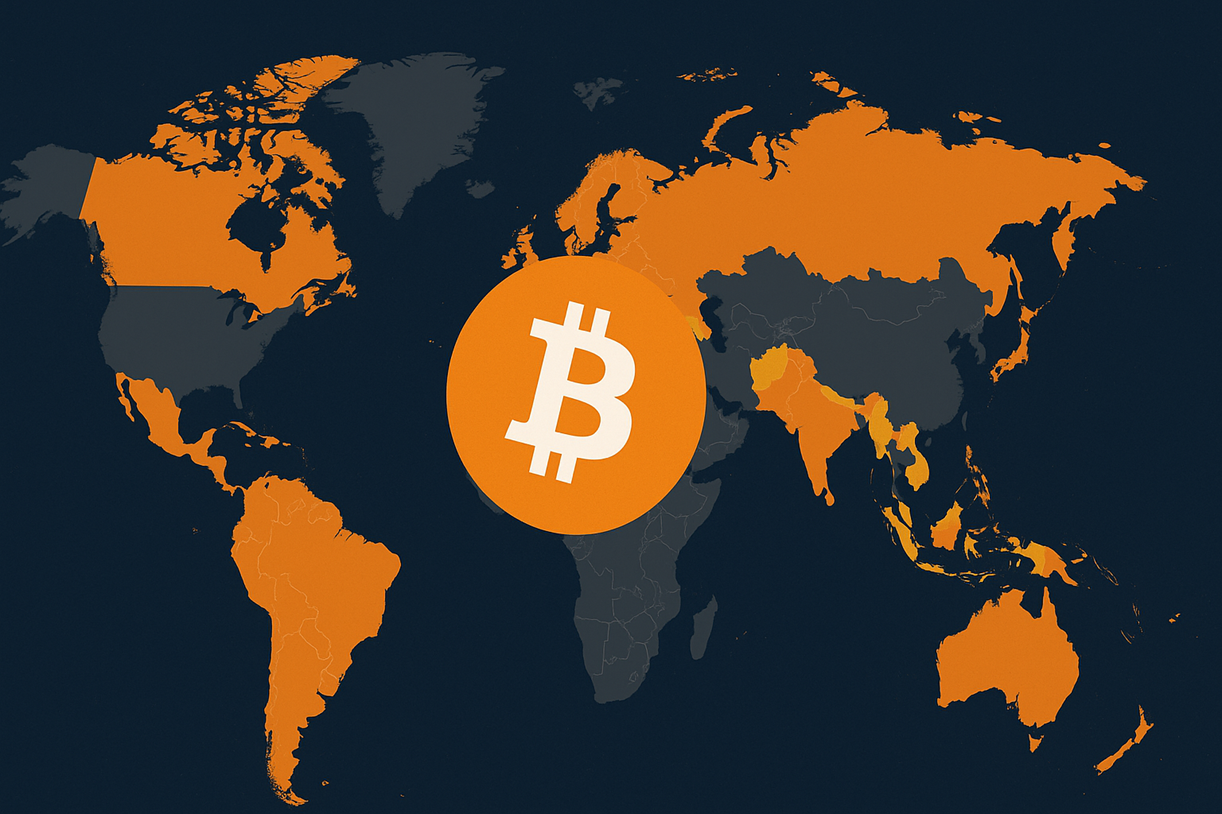A brand new Bitcoin Policy Institute (BPI) report argues that nation-state engagement with Bitcoin has moved past legal-tender experiments right into a broader set of “publicity” pathways—from strategic reserves and sovereign mining to pensions, sovereign wealth funds and tax acceptance—marking what the authors describe as a game-theoretic race amongst governments.
Nation-State Bitcoin Adoption Accelerates
The examine, authored by Jake Langenkamp and Renee Sorchik and on September 22, 2025, concludes that “27 international locations presently have some measure of publicity to bitcoin—roughly one in seven worldwide,” with an extra “13 international locations [that] have proposed adoption measures by way of laws or coverage initiatives.”
The report is specific about scope and definitions. “Exposure was outlined as any official path a authorities might take to personal, earn, or typically profit from bitcoin,” a framework that intentionally appears past the slender query of authorized tender to seize the range of sovereign approaches now evident throughout areas and political programs.
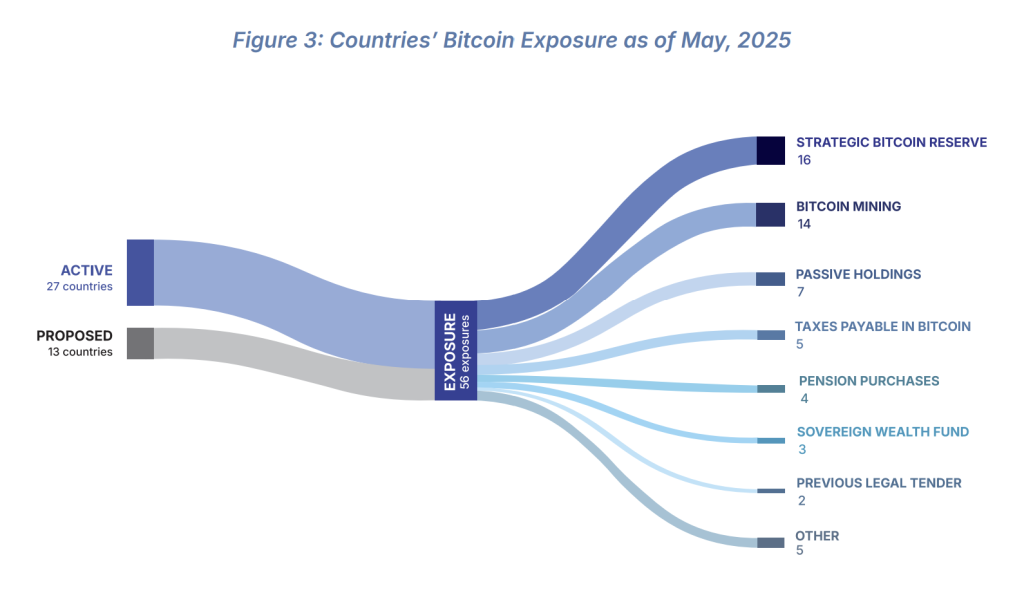
The authors deal with sub-national pilots—similar to state-level reserves or municipal tax packages—as legitimate situations of nation-state publicity as a result of they’ll scale into nationwide coverage. Data assortment closed on June 6, 2025, with first-half 2025 occasions aggregated as a single interval to replicate the late-quarter cadence of bulletins.
The topline counts underpin a bigger narrative of acceleration. As of end-May 2025, the dataset covers “32 international locations—roughly one out of each six nations on Earth—[that] both already had bitcoin publicity or was actively pursuing it by way of laws or coverage,” subdivided into 27 energetic and 13 proposed. The authors warning that classes can overlap, with particular person international locations showing in a number of modalities; the United Arab Emirates, for instance, is famous as combining government-backed mining, sovereign wealth fund ETF purchases, and tax acceptance.
Modalities cluster round a couple of dominant channels. Counting each energetic and proposed, the commonest is a Strategic Bitcoin Reserve (SBR), recognized in 16 international locations, adopted by government-backed mining (14).
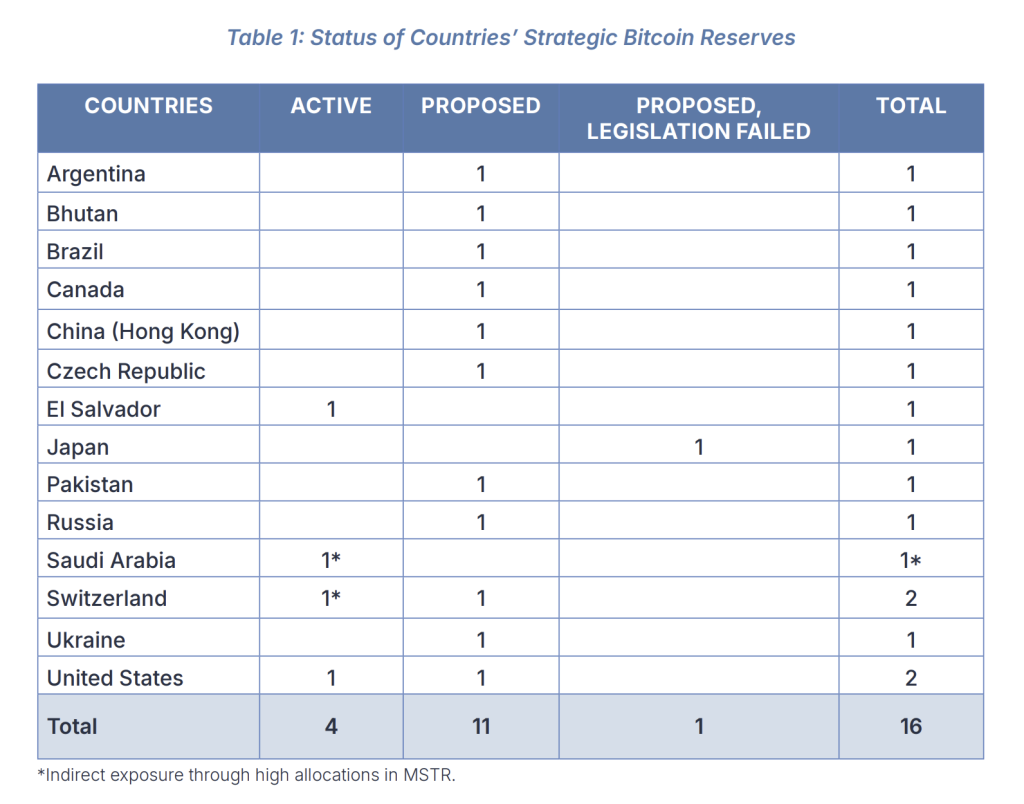
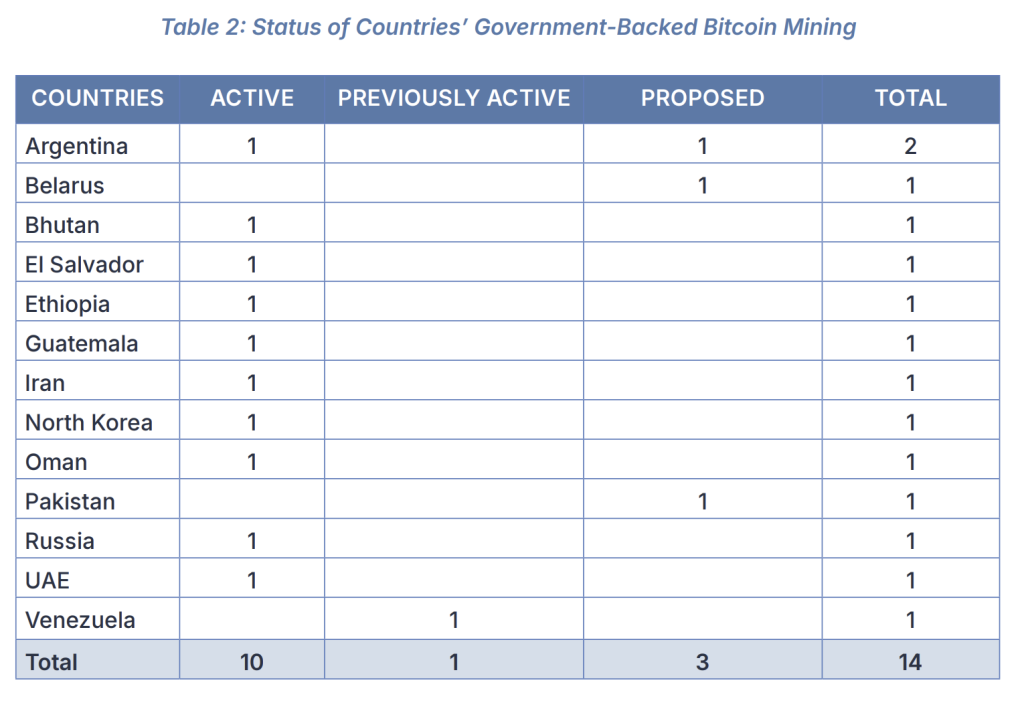
Passive holdings—sometimes seized property that authorities have elected to not promote—are recorded in seven international locations, whereas 5 international locations settle for sure taxes in bitcoin. Government cash managers seem on either side of the steadiness sheet: 4 pension programs and three sovereign wealth funds present direct or oblique publicity, together with through fairness in BTC-treasury firms.
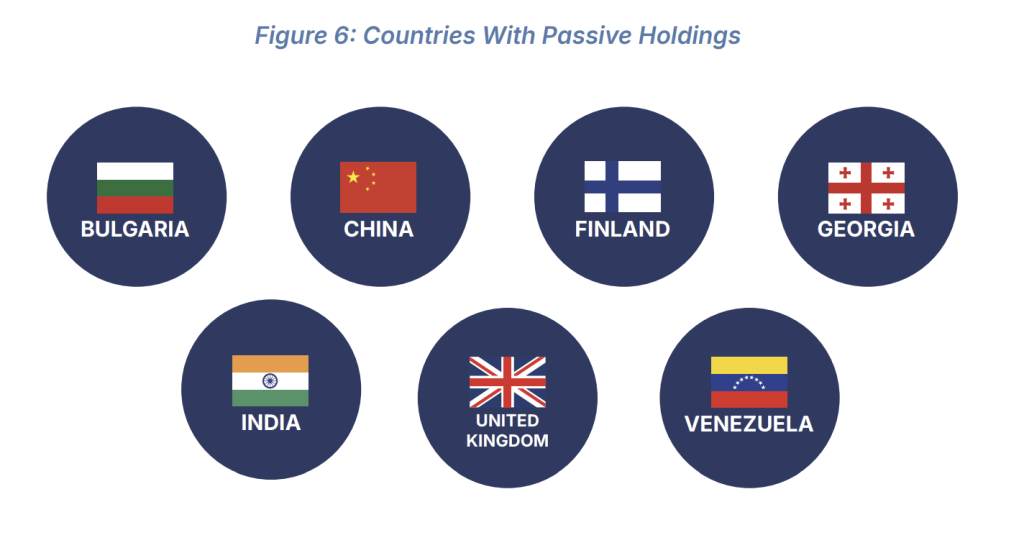
Two international locations are recorded for prior legal-tender standing (El Salvador and the Central African Republic), and a handful of country-specific outliers embrace a government-backed crypto change pilot (Russia), a particular financial zone recognizing bitcoin as a unit of account (Honduras), and the usage of seized BTC for public debt (North Korea).
Different Options For Bitcoin Exposure
The authors disaggregate what’s energetic right now versus what stays on the drafting board. Among energetic exposures, they determine 11 international locations with government-backed mining, seven with passive holdings, 4 with SBRs, 4 taking tax funds in bitcoin, and sovereign wealth funds or pensions in a smaller however notable position. Proposed measures skew much more closely towards SBRs: “12 of the 13 international locations” with proposals goal a reserve mannequin, alongside restricted proposals for mining, pensions and tax acceptance.
A brief checklist illustrates the reserve spectrum the report captures. “Four international locations had been categorised as having energetic strategic bitcoin reserves.” In the United States and El Salvador, reserves are “extra conventional,” with direct holding and/or accumulation. By distinction, the central banks of Switzerland and Saudi Arabia are categorised as having oblique reserves by way of “giant positions in MSTR,” reflecting the authors’ broader definition of oblique publicity through fairness in bitcoin-treasury firms.
The examine situates El Salvador as an early legal-tender mover that subsequently emphasised balance-sheet accumulation. It recounts that El Salvador “has amassed roughly 6,100 BTC,” and notes coverage changes round service provider acceptance, underscoring the authors’ level that authorized tender is just one, and never essentially probably the most sturdy, channel for nationwide adoption. “As these examples present, authorized tender standing isn’t the one route for nation state adoption. Sovereign custody, institutional buying, and strategic program design might show extra sturdy paths.”
The United States anchors a separate thread within the dataset. The authors describe US President Donald Trump’s Executive Order that “differentiated bitcoin from different cryptocurrencies and set a coverage of retaining, quite than promoting, bitcoin holdings,” framing an SBR structure and, per the report’s government abstract, catalyzing copy-cat proposals overseas. They add that “sixteen nations have now proposed or enacted laws for SBRs in an analogous context to the US,” and that a number of North American municipalities and worldwide cities have moved to simply accept taxes in BTC.
Passive holdings, whereas not proactive coverage, are handled as policy-relevant as a result of non-liquidation alerts an evolving treasury stance. The report lists Bulgaria, China, Finland, Georgia, India, the United Kingdom and Venezuela as international locations with seized BTC presumed to stay on authorities books. “While accumulation by way of seizure isn’t a proactive technique, the noteworthy facet of passive holdings is that they’ve but bought the bitcoin,” the authors write.
The taxonomy is complemented by a methodological observe on inclusions and exclusions. Rumors and campaign-only guarantees are filtered out, and the examine introduces a direct versus oblique publicity lens: direct holdings, ETFs or mining on one aspect; on the opposite, exposures “similar to fairness positions in bitcoin-treasury firms like MicroStrategy (MSTR).” This framework permits Switzerland and Saudi Arabia to look as reserve holders regardless of the route being portfolio fairness quite than on-chain cash.
The report’s conclusion elevates the macro implications. Bitcoin, it argues, is “a brand new macroeconomic asset, the primary of its sort in additional than a century.” Early adopters might reap portfolio and financing benefits: the authors focus on “Bit-Bonds,” through which BTC capabilities as partial collateral to draw institutional demand and doubtlessly decrease sovereign borrowing prices, and posit that bitcoin-based settlement bridges might scale back cross-border frictions. The underlying thesis is that momentum in 2024–2025—captured within the examine’s timeline and counts—makes a wholesale reversal unbelievable as extra jurisdictions institutionalize bitcoin in public-finance workflows.
At press time, BTC traded at $112,490.
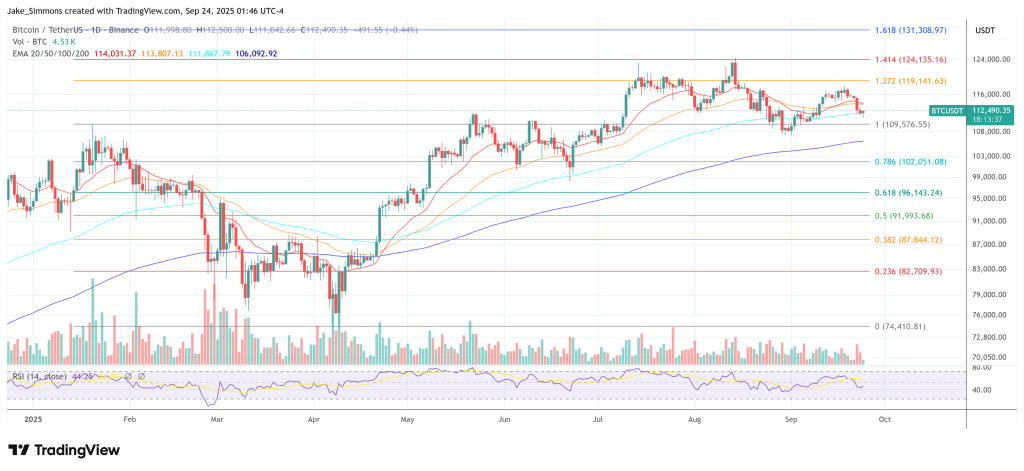
Featured picture created with DALL.E, chart from TradingView.com

Editorial Process for bitcoinist is centered on delivering completely researched, correct, and unbiased content material. We uphold strict sourcing requirements, and every web page undergoes diligent evaluation by our staff of high expertise consultants and seasoned editors. This course of ensures the integrity, relevance, and worth of our content material for our readers.



